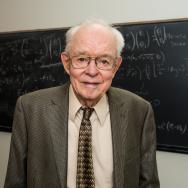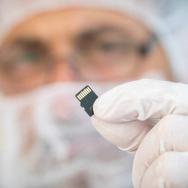On Aug. 11, the launch window opens for NASA’s Parker Solar Probe to begin its journey to the corona of the sun, a mission that will bring a spacecraft closer to the sun than any ever before.
Watching from the Kennedy Space Center in Florida will be University of Chicago Prof. Emeritus Eugene Parker, who has dedicated his life to unraveling the sun’s mysteries. He is the first living person to have a spacecraft named after him and is now preparing at the age of 91 to become the first person to see his namesake mission thunder into space.
Parker is best known for his pioneering research on the sun, which radically changed scientists’ understandings of the solar system. In the 1950s, he proposed the concept of solar wind, showing that the sun radiates a constant and intense stream of charged particles that travel throughout the solar system at about one million miles per hour. This is visible as the halo around the sun during an eclipse, and it can affect missions in space as well as satellite communication systems on Earth.
“The solar probe is going to a region of space that has never been explored before. It’s very exciting that we’ll finally get a look,” said Parker, who was on the UChicago faculty from 1955 to 1995. “One would like to have some more detailed measurements of what’s going on in the solar wind. I’m sure that there will be some surprises. There always are.”
Parker’s theory of the solar wind challenged conventional understandings of the sun, causing scientists at the time to dismiss his work. Parker barely managed to publish the original 1958 paper that presented his theory. But he firmly defended his work, and he was ultimately proven correct in 1962 with data collected by the first successful interplanetary mission, the Mariner II space probe to Venus.
“Gene Parker’s story is about challenging assumptions. He came up with a new theory and proved that theory through meticulous, scientific calculations,” said Angela Olinto, dean of the Division of the Physical Sciences at UChicago. “Gene carries on a great tradition at UChicago of questioning the status quo to make discoveries and create whole new fields of science.”
NASA last year named its most important mission to the sun after Parker as a tribute to his work, which established a new field of solar research. He stands as a giant among researchers who continue to push the boundaries of science, such as UChicago scientists Wendy Freedman, who was first to precisely measure the expansion rate of the universe, and Michael Turner, who coined the term dark energy.
The Parker Solar Probe is scheduled to launch during a period that opens Aug. 11. The spacecraft will use seven flybys of Venus to slowly reduce its orbital distance and drop closer to the sun. Three of the spacecraft’s orbits will bring it within 3.83 million miles of the sun’s surface—approximately seven times closer than any other previous mission.
The spacecraft’s observations will help scientists understand why the corona is hotter than the sun’s surface, how the solar wind is accelerated and what drives intense, energetic particles that can affect astronauts or interfere with onboard satellite electronics, among other questions.
Although Parker is the first living person to have a spacecraft named after him, he is the fifth of his peers at UChicago to have the honor, with the other four having won the recognition posthumously. They include alumnus Edwin Hubble, AB 1910, PhD 1917, with the Hubble Space Telescope; Nobel laureate Subrahmanyan Chandrasekhar, a UChicago professor who worked with Parker, with the Chandra X-ray Observatory; Enrico Fermi, a Nobel laureate and UChicago professor, with the Fermi Gamma-Ray Telescope; and Nobel laureate Arthur Holly Compton, a UChicago professor, with the Compton Gamma Ray Observatory.
Those who want to view the launch can watch on NASA’s livestream. The daily launch window runs from 3:15 to 5:15 a.m. CST starting on Aug. 11.

